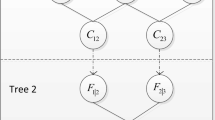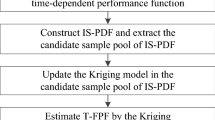Abstract
The time-dependent failure probability function (TDFPF) is defined as a function of the time-dependent failure probability (TDFP) varying with the design parameters and the service time, and it is useful in the reliability-based design optimization for the time-dependent problem. For the lack of method estimating TDFPF, the direct Monte Carlo simulation (DMCS) and an adaptive Kriging-MCS based on Bayes formula (shorten as AK-MCS-Bay) are developed to estimate TDFPF. The DMCS is time-consuming, but its convergent solution can be used as reference to validate other methods. In the AK-MCS-Bay, the TDFPF is primarily transformed into the estimation of the augmented TDFP and the conditional probability density function (PDF) of design parameters on the time-dependent failure event. Then, a single AK model is constructed to efficiently identify the failure samples in the MCS sample pool at different service times. By using these identified failure samples, the TDFPs under different service times can be estimated by the double-loop MCS without any extra model evaluations, and the conditional PDF of design parameters can be also acquired by the kernel density estimation method. The numerical and engineering examples indicate the efficiency and accuracy of the proposed method.

















Similar content being viewed by others
References
Au SK (2005) Reliability-based design sensitivity by efficient simulation. Comput Struct 83(14):1048–1061
Au SK, Beck JL (2001) Estimation of small failure probabilities in high dimensions by subset simulation. Probab Eng Mech 16(4):263–277
Botev ZI, Grotowski JF, Kroese DP (2010) Kernel density estimation via diffusion. Ann Stat 38:2916–2957
Ching JY, Hsieh YH (2007) Local estimation of failure probability function and its confidence interval with maximum entropy principle. Probab Eng Mech 22:39–49
Du XP Time-dependent mechanism reliability analysis with envelope functions and first-order approximation. J Mech Des 136(8):081010
Du XP, Sudjianto A (2004) The first order saddle point approximation for reliability analysis. AIAA J 42(6):1199–1207
Echard B, Gayton N, Lemaire M (2011) AK-MCS: an active learning reliability method combining Kriging and Monte Carlo simulation. Struct Saf 33:145–154
Enevoldsen I, Sorensen JD (1994) Reliability-based optimization in structural engineering. Struct Saf 15:169–196
Fan CQ, Lu ZZ, Shi Y (2019) Time-dependent failure possibility analysis under consideration of fuzzy uncertainty. Fuzzy Sets Syst article in press
Feng KX, Lu ZZ, Yun WY (2019a, article in press) Aircraft icing severity analysis considering three uncertainty types. AIAA J. https://doi.org/10.2514/1.J057529
Feng KX, Lu ZZ, Ling CY, Yun WY (2019b) An innovative estimation of failure probability function based on conditional probability of parameter interval and augmented failure probability. Mech Syst Signal Process 123:606–625
Feng KX, Lu ZZ, Pang C, Yun WY (2019c) Time-dependent failure credibility analysis and its optimization based computational methods. Eng Struct 181:605–616
Gasser M, Schueller GI (1997) Reliability-based optimization of structural systems. Math Meth Oper Res 46(3):287–307
Ghanem RG, Spanos PD (2003) Stochastic finite elements: a spectral approach. Springer, New York
Hammersley A, Svensson S, Hanfland M, Fitch A, Hausermann D (1996) Two-dimensional detector software: from real detector to idealised image or two-theta scan. Int J High Pressure Res 14(4–6):235–248
Hu Z, Du XP (2012) Reliability analysis for hydrokinetic turbine blades. Renew Energy 48(1):251–262
Hu Z, Du XP (2013) Time-dependent reliability analysis with joint upcrossing rates. Struct Multidiscip Optim 48:893–907
Hu Z, Du X (2015a) First order reliability method for time-variant problems using series expansions. Struct Multidiscip Optim 51(1):1–21
Hu Z, Du XP (2015b) Mixed efficient global optimization for time dependent reliability analysis. J Mech Des 137(5):051401
Hu Z, Mahadevan S (2016) A single-loop kriging surrogate modelling for time-dependent reliability analysis. J Mech Des 138(6):061406
Hu Z, Li HF, Du XP (2013) Simulation-based time-dependent reliability analysis for composite hydrokinetic turbine blades. Struct Multidiscip Optim 47:765–781
Izenman AJ (2008) Modern multivariate statistical techniques: regression, classification and manifold learning. Spring-Verlag, New York
Jensen HA (2005) Structural optimization of linear dynamical systems under stochastic excitation: a moving reliability database approach. Comput Methods Appl Mech Eng 194(12–16):1757–1778
Li CQ (1995) Computation of the failure probability of deteriorating structural systems. Comput Struct 56(6):1073–1079
Li CC, Der Kiureghian A (1993) Optimal discretization of random fields. J Mech Des 119(6):1136–1154
Meng Z, Zhang DQ, Liu ZT, Li G (2018) An adaptive directional boundary sampling method for efficient reliability-based design optimization. J Mech Des 140(12):121406
Meng Z, Zhang DQ, Li G, Yu B (2019) An importance learning method for non-probabilistic reliability analysis and optimization. Struct Multidiscip Optim 59(4):1255–1271
Okuda S, Yonezawa M, Shao S et al (1997) Time-dependent structural reliability analysis based on directional simulation. Trans Jpn Soc Mech Eng 63(612):1771–1777
Papadrakakis M, Lagaros ND (2002) Reliability-based structural optimization using neural networks and Monte Carlo simulation. Comput Methods Appl Mech Eng 191(32):3491–3507
Park BU, Marron JS (1990) Comparison of deta-driven bandwidth selectors. J Am Stat Assoc 85:66–72
Sacks J, Schiller SB, Welch WJ (1989) Design for computer experiment. Technimetrics 31(1):41–47
Saltelli A, Ratto M, Andres T, Campolongo F, Cariboni J, Gatelli D et al (2008) Global sensitivity analysis. The primer. John Wiley and Sons, Chichester
Scott DW (1992) Multivariate density estimation: theory, practice, and visualization. Wiley, New York
Shi Y, Lu ZZ, Cheng K, Zhou YC (2017) Temporal and spatial multi-parameter dynamic reliability and global reliability sensitivity analysis based on the extreme value moments. Struct Multidiscip Optim 56(1):117–129
Stein M (1987) Large sample properties of simulations using Latin hypercube sampling. Technimetrics 29(2):143–151
Wang ZQ, Wang PF (2012) A nested extreme response surface approach for time-dependent reliability-based design optimization. J Mech Des 134(12):121007
Wang ZQ, Wang PF (2015) A double-loop adaptive sampling approach for sensitivity-free dynamic reliability analysis. Reliab Eng Syst Saf 142:346–356
Xu LY, Lu ZZ, Xiao SN (2019) Generalized sensitivity indices based on vector projection with multivariate outputs. Appl Math Model 66:592–610
Yuan XK (2013) Local estimation of failure probability function by weighted approach. Probab Eng Mech 34:1–11
Yun WY, Lu ZZ, Jiang X, Zhao LF (2017) Maximum probable life time analysis under the required time-dependent failure probability constraint and its meta-model estimation. Struct Multidiscip Optim 55:1439–1451
Yun WY, Lu ZZ, Jiang X (2019a) A novel step-wise AK-MCS method for efficient estimation of fuzzy failure probability under probability inputs and fuzzy state assumption. Eng Struct 183:340–350
Yun WY, Lu ZZ, Jiang X (2019b) An efficient method for moment-independent global sensitivity analysis by dimensional reduction technique and principle of maximum entropy. Reliab Eng Syst Saf. article in press
Yun WY, Lu ZZ, Jiang X (2019c) AK-SYSi: an improved adaptive Kriging model for system reliability analysis with multiple failure modes by a refined U learning function. Struct Multidiscip Optim 59(1):263–278
Zhang J, Ellingwood B (1994) Orthogonal series expansions of random fields in reliability analysis. J Mech Des 120(12):2660–2677
Zhang DQ, Han X, Jiang C, Liu J (2017) Time-dependent reliability analysis through response surface method. J Mech Des 139:041404
Zhao YG, Ono T (2001) Moment method for structural reliability. Struct Saf 23(1):47–75
Zhou YC, Lu ZZ, Cheng K, Yun WY (2019) A Bayesian Monte Carlo-based method for efficient computation of global sensitivity indices. Mech Syst Signal Process 117(15):498–516
Zou T, Mahadevan S (2006) A direct decoupling approach for efficient reliability-based design optimization. Struct Multidiscip Optim 31(3):190–200
Funding
This work was supported by the National Natural Science Foundation of China (Grant No. NSFC 51775439) and the Innovation Foundation for Doctor Dissertation of Northwestern Polytechnical University (Grant No. CX201934).
Author information
Authors and Affiliations
Corresponding author
Ethics declarations
Conflict of interest
The authors declare that they have no conflict of interest.
Additional information
Responsible Editor: Byeng D Youn
Replication of results
The original codes of the three numerical examples in the Sect. 5 are available in the Supplementary materials, i.e., Test 1.m, Test 2.m, Test 3.m, and Test 4.m.
Rights and permissions
About this article
Cite this article
Feng, K., Lu, Z., Ling, C. et al. Efficient computational method based on AK-MCS and Bayes formula for time-dependent failure probability function. Struct Multidisc Optim 60, 1373–1388 (2019). https://doi.org/10.1007/s00158-019-02265-z
Received:
Revised:
Accepted:
Published:
Issue Date:
DOI: https://doi.org/10.1007/s00158-019-02265-z




